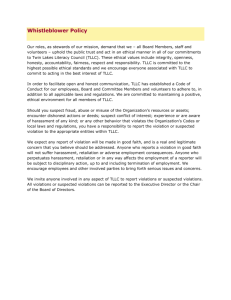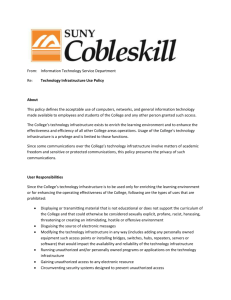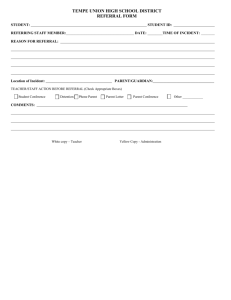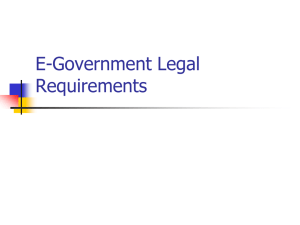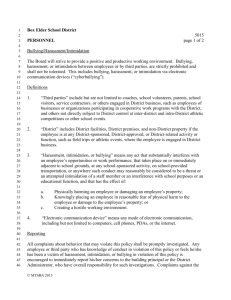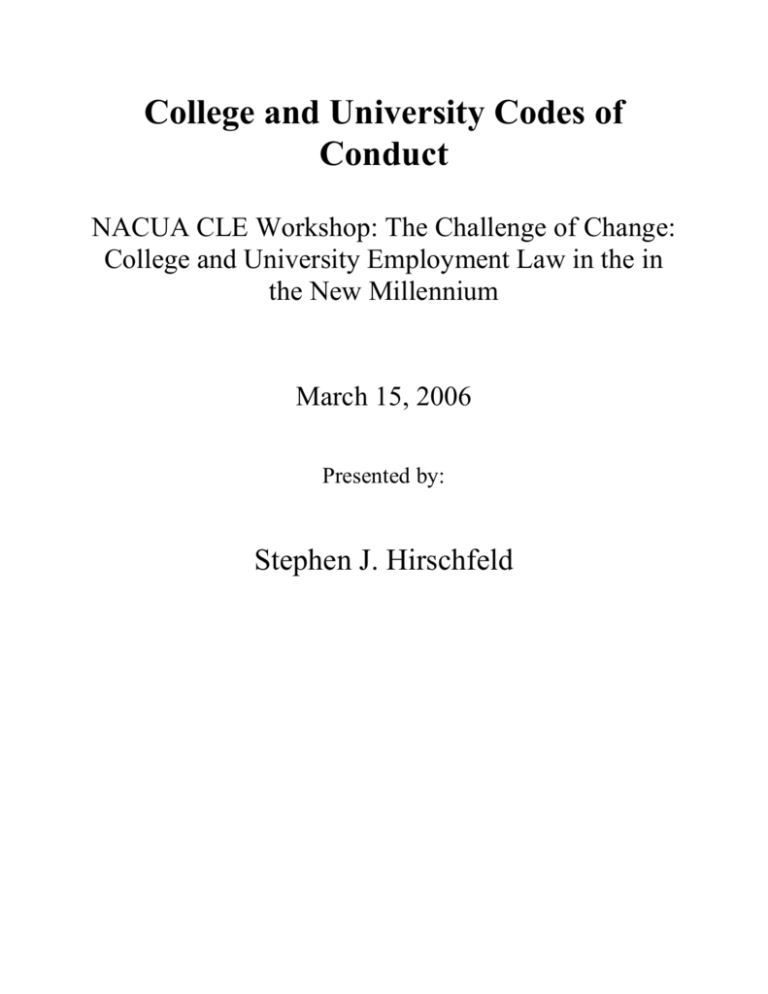
College and University Codes of
Conduct
NACUA CLE Workshop: The Challenge of Change:
College and University Employment Law in the in
the New Millennium
March 15, 2006
Presented by:
Stephen J. Hirschfeld
FACULTY CODE OF CONDUCT AND ETHICS
PREAMBLE
As members of the College community all faculty are responsible for sustaining the highest
ethical standards of this institution, and of the broader community in which we function. The
College values integrity, honesty and fairness and strives to integrate these values into its
teaching, research and business practices. It is the intent of the Faculty Code of Conduct and
Ethics to protect academic freedom, to help preserve the highest standard of teaching and
scholarship, and to advance the mission of the College.
DEFINITIONS
1.
The term College means [name of institution].
2.
The term “student” includes all persons taking courses at the College either fulltime or part-time, pursuing undergraduate, graduate or professional studies. Persons who are not
officially enrolled for a particular term but who have a continuing relationship with the College
or who have been notified of their acceptance for admission are considered “students” as are
persons who are living in the College residence halls, although not enrolled in this institution.
3.
The term “faculty member” means any person hired by the College to conduct
classroom or teaching activities or who is otherwise considered by the College to be a member of
its faculty.
4.
The term “staff” includes any full-time and part-time employee of the College
who holds managerial, administrative, clerical, technical, skilled craft, service or other positions
designated by the College to be subject to these rules, policies, procedures and benefits.
5.
The term “College official” includes any person employed by the College,
performing assigned administrative or professional responsibilities.
6.
The term “member of the College community” includes any person who is a
student, faculty member, College official or any other person employed or contracted by the
College. A person’s status in a particular situation shall be determined by [title of appropriate
college administrator].
7.
The term “College premises” includes all land, buildings, facilities, and other
property in the possession of or owned, used, or controlled by the College.
8.
The term “policy” means the written regulations of the College as found in, but
not limited to, the Faculty Code of Conduct and Ethics, the College website, Residence Life
Handbook, Computer Use Policy, and Graduate/Undergraduate Catalogs.
National Association Of College and University Attorneys
2
©2006 Curiale Dellaverson Hirschfeld & Kraemer, LLP
9.
The term “plagiarism” includes, but is not limited to, the use, by paraphrase or
direct quotation, of the published or unpublished work of another person without full and clear
acknowledgment.
ETHICAL STANDARDS
1.
Faculty, guided by a deep conviction of the worth and dignity of the advancement
of knowledge, recognize the special responsibilities placed upon them. Their primarily
responsibility to their subject is to seek and to state the truth as they see it. To this end faculty
devote their energies to developing and improving their scholarly competence. They accept the
obligation to exercise critical self-discipline and judgment in using, extending, and transmitting
knowledge. They practice intellectual honesty. Although faculty may follow subsidiary
interests, these interests must never seriously hamper or compromise their freedom of inquiry.
2.
As teachers, faculty encourage the free pursuit of learning in their students. They
hold before them the best scholarly and ethical standards of their discipline. Faculty demonstrate
respect for students as individuals and adhere to their proper roles as intellectual guides and
counselors. Faculty make every reasonable effort to foster honest academic conduct and to
ensure that their evaluations of students reflect each student’s true merit. They respect the
confidential nature of the relationship between faculty and student. They avoid any exploitation,
harassment or discriminatory treatment of students. They acknowledge significant academic or
scholarly assistance from them. They protect their academic freedom.
3.
As colleagues, faculty have obligations that derive from common membership in
the community of scholars. Faculty do not discriminate against or harass colleagues. They
respect and defend the free inquiry of associates. In the exchange of criticism and ideas faculty
show due respect for the opinions of others. Faculty acknowledge academic debt and strive to be
objective in their professional judgment of colleagues. Faculty accept their share of faculty
responsibilities for the governance of their institution.
4.
As members of an academic institution, faculty seek above all to be effective
teachers and scholars. Although faculty have a right to academic freedom, this right does not
limit the faculty member’s responsibility and requirements to follow all provisions in this Faculty
Code of Conduct and all other College policies. Faculty give due regard to their paramount
responsibilities within their institution in determining the amount and character of work done
outside it. When considering the interruption or termination of their service, faculty recognize
the effect of their decision upon the program of the institution and give due notice of their
intentions.
5.
As members of their community, faculty have the rights and obligations of other
citizens. Faculty measure the urgency of these obligations in the light of their responsibilities to
their subject, to their students, to their profession, and to their institution. When they speak or
act as private persons, they avoid creating the impression of speaking or acting for their college
or university. As citizens engaged in a profession that depends upon freedom for its health and
National Association Of College and University Attorneys
3
©2006 Curiale Dellaverson Hirschfeld & Kraemer, LLP
integrity, faculty have a particular obligation to promote conditions of free inquiry and to further
public understanding of academic freedom.
PROSCRIBED CONDUCT
A.
Jurisdiction of the College Faculty Code of Conduct and Ethics
The Faculty Code of Conduct and Ethics shall apply to conduct that occurs on College premises,
at College sponsored activities, and to off-campus conduct that adversely affects the College
community and/or faculty member’s fitness to perform his/her professional and teaching
responsibilities. Each faculty member shall be responsible for his/her conduct through his/her
employment relationship with the College. The [title of administrator] shall decide whether the
Faculty Code shall be applied to conduct occurring off campus, on a case by case basis, in his/her
sole discretion.
B.
Conduct – Rules and Regulations
In the spirit of the ethical standards set forth above, faculty are required to comply with the
following College policies and may be subject to disciplinary action as outlined in [Refer to
Faculty Disciplinary Policy and Procedure] for failure to comply:
1.
Failure to fulfill instructional or other professional duties, including but not
limited to the following:
a.
arbitrary denial of access to instruction;
b.
significant intrusion of material unrelated to the course
c.
significant failure to adhere, without legitimate reason, to the rules of the
faculty in the conduct of courses, to meet class, to keep office hours, or to
hold examinations as scheduled;
d.
evaluation of student work by criteria not directly reflective of course
performance; and
e.
undue and unexcused delay in evaluating student work.
2.
Violations of the Confidentiality and Privacy Policy. Faculty members must
comply with all federal laws, state laws, agreements with third parties, and University policies
and principles pertaining to the use, protection, and disclosure of various types of confidential,
proprietary, and private information. Such policies apply even after the faculty member’s
relationship with the institution ends.
3.
Violation of the Conflict of Interest Policy.
National Association Of College and University Attorneys
4
©2006 Curiale Dellaverson Hirschfeld & Kraemer, LLP
4.
Violations of the College’s Discrimination and Harassment Policy.
Discrimination, including harassment, against another community member, including but not
limited to students, faculty, staff, administrators, and independent contractors, on political
grounds, or for reasons of race, religion, sex, age, disability, and any other basis prohibited by
state, federal, and/or local law, or for other arbitrary or personal reasons. Where actions are
found to have occurred that violate this standard, the College will take prompt action to cease the
offending conduct, prevent its recurrence and discipline those responsibilities.
5.
Harassment of any person, including, but not limited to, violation of the Sexual
Harassment Policy.
6.
Violation of the Sexual Misconduct Policy.
7.
Theft, misuse, or abuse of College resources. College resources must be reserved
for business purposes on behalf of the College. They may not be used for personal gain, and may
not be used for personal use except in a manner that is incidental, and reasonable in light of the
faculty member’s duties. College resources include, but are not limited to, the use of College
systems, such as telephone systems, data communication and networking services, and the
domain for electronic communication forums; and the use of College equipment; and the use of
procurement tools such as purchasing cards and petty cash; and the time and effort of other staff,
students, and others at the College.
8.
Violation of the Academic and/or Scientific Misconduct Policy, including
fabrication, falsification, plagiarism, or other practices that seriously deviate from those that are
commonly accepted as proper for proposing, conducting, or reporting research. It does not
include honest error or honest differences in interpretations or judgments of data. Refer to the
College’s Academic and Scientific Misconduct Policy.
9.
Disruption or obstruction of lawful institutional activities and functions.
10.
Threats, intimidation, physical contact, physical abuse harassment, coercion and
any other conduct which threatens or endangers the health or safety of any person.
11.
Attempted or actual theft, unauthorized possession, and/or damage to property of
the College, any person, or any other entity.
12.
Unauthorized use of institutional resources or facilities for personal, commercial,
political, or other improper purposes.
13.
Violation of safety rules and policies.
14.
Possession or use on the College premises of any weapon (i.e. firearms and
dangerous knives), dangerous instruments, explosive devices, fireworks, or dangerous chemicals.
15.
limited to:
Theft, abuse, and/or misuse of computer facilities and resources, including but not
National Association Of College and University Attorneys
5
©2006 Curiale Dellaverson Hirschfeld & Kraemer, LLP
a.
Unauthorized entry into a file, to use, read, or change contents, or for any
other purpose.
b.
Unauthorized transfer of a file.
c.
Use of another individual’s identification and/or password.
d.
Use of computing facilities and resources to interfere with the work of a
student, faculty member or College official.
e.
Use of computing facilities to and resources to send obscene or abusive
messages.
f.
Use of computing facilities and resources to interfere with normal
operation of the College computing system.
g.
Use of computing facilities and resources in violation of copyright laws.
h.
Any violation of the College Computer Use Policy.
16.
Evaluating faculty members by criteria not directly reflective of professional
performance.
17.
Violations of other published College policies in hard copy or available on the
College website.
18.
Intentionally misrepresenting personal views as the position of the institution.
19.
Conviction of criminal acts which demonstrate unfitness as a faculty member,
including but not limited to crimes of moral turpitude.
20.
Engaging in a romantic and/or sexual relationship with a student. No faculty
member should simultaneously be romantically or sexually involved with a student whom he or
she teaches, advises, coaches, or supervises in any way. Individuals in such positions of
authority must not allow these relationships to develop or continue.
21.
Unauthorized use of alcohol or being under the influence of alcohol while
performing job duties, instructing students, and/or in the presence of students.
22.
Providing alcoholic beverages to any student under twenty-one (21) years of age.
23.
Possession, distribution, sale or use, or being under the influence of, illegal drugs
while on College premises, participating in College-sponsored activities, representing the
College, or performing job duties. Illegal drugs, as referred to in this policy, include drugs that
are not legally obtainable, as well as drugs that are legally obtainable but used for illegal or
unauthorized purposes.
National Association Of College and University Attorneys
6
©2006 Curiale Dellaverson Hirschfeld & Kraemer, LLP
24.
Violation of intellectual property rights as defined in the College Intellectual
Property Policy. Faculty members must abide by all rules and laws governing the use of
copyrighted materials, patented ideas, licenses, and proprietary information. Faculty must refrain
from any activity that constitutes infringement of individual or College intellectual property and
properly attribute the ideas and work of others.
25.
Interference with disciplinary procedures, including but not limited to destroying
or concealing evidence, providing false or misleading information, intimidation of witnesses, or
inducing a witness to provide withhold information or provide false information.
26.
27.
College.
Violation of Whistleblower Policy.
Failure or refusal to cooperate in or interference with an investigation by the
STAFF CODE OF CONDUCT AND ETHICS
PREAMBLE
As members of the College community all staff employees are responsible for sustaining the
highest ethical standards of this institution, and of the broader community in which we function.
The College values integrity, honesty and fairness and strives to integrate these values into its
teaching, research and business practices. It is the intent of the Staff Code of Conduct and Ethics
to protect academic freedom, to help preserve the highest standard of teaching and scholarship,
and to advance the mission of the College.
DEFINITIONS
1.
The term College means [name of institution].
2.
The term “student” includes all persons taking courses at the College either fulltime or part-time, pursuing undergraduate, graduate or professional studies. Persons who are not
officially enrolled for a particular term but who have a continuing relationship with the College
or who have been notified of their acceptance for admission are considered “students” as are
persons who are living in the College residence halls, although not enrolled in this institution.
3.
The term “faculty member” means any person hired by the College to conduct
classroom or teaching activities or who is otherwise considered by the College to be a member of
its faculty.
4.
The term “staff” includes any full-time and part-time employee of the College
who holds managerial, administrative, clerical, technical, skilled craft, service or other positions
designated by the College to be subject to these rules, policies, procedures and benefits.
National Association Of College and University Attorneys
7
©2006 Curiale Dellaverson Hirschfeld & Kraemer, LLP
5.
The term “member of the College community” includes any person who is a
student, faculty member, College official or any other person employed or contracted by the
College. A person’s status in a particular situation shall be determined by [title of appropriate
college administrator].
6.
The term “College premises” includes all land, buildings, facilities, and other
property in the possession of or owned, used, or controlled by the College.
7.
The term “organization” means any number of persons who have complied with
the formal requirements for College recognition or registration.
8.
The term “policy” means the written regulations of the College as found in, but
not limited to, the Staff Code of Conduct and Ethics, Residence Life Handbook, the College
website, Computer Use Policy, and Graduate/Undergraduate Catalogs.
PROSCRIBED CONDUCT
A.
Jurisdiction of the College Staff Code of Conduct and Ethics
The Staff Code of Conduct and Ethics shall apply to conduct that occurs on College premises, at
College sponsored activities, and to off-campus conduct that adversely affects the College
Community and/or staff member’s fitness to perform his/her professional responsibilities. Staff
employees that have teaching responsibilities are also required to comply with the Faculty Code
of Conduct and Ethics. Each staff member shall be responsible for his/her conduct throughout
his/her employment relationship with the College.
B.
Conduct – Rules and Regulations
Staff employees are required to comply with basic standards of conduct and professionalism as
members of the College community. Failure to comply with the Staff Code may result in
disciplinary action up to and including termination as outlined in [cite Discipline/Termination
policy]. This list is non-exhaustive and the College reserves the right to discipline staff for
conduct not listed below.
1.
Neglect of duty and/or lack of due care and/or diligence in the performance of
duties.
2.
Unsatisfactory job performance or failure to maintain reasonable standards of
performance.
3.
Inappropriate appearance including failure to maintain personal appearance or
dress, including uniform or style of dress, according to departmental standards.
4.
Poor attitude and discourtesy toward others (for example, rudeness or lack of
cooperation).
National Association Of College and University Attorneys
8
©2006 Curiale Dellaverson Hirschfeld & Kraemer, LLP
5.
Excessive absenteeism or tardiness, or an unacceptable pattern of absences.
6.
Insubordination, including refusal to comply with a supervisor’s instructions
unless the instructions are illegal, endangering, or unethical.
7.
Gambling while on duty.
8.
Unauthorized use of the College’s name or letterhead for personal business.
9.
Theft, misappropriation, and/or unauthorized possession or removal of property
belonging to the College, members of the College community, or other persons with whom the
College has a business relationship.
10.
Concealing, falsifying, altering, misusing, or removing records, including
electronic data records.
11.
Direct or indirect misuse of College resources, including property leased to the
College, for other than officially approved activities (including, but not limited to, employees,
facilities, mail service, supplies, equipment, and university computing and communication
resources, including computers, networks, electronic mail services, electronic information
sources, voicemail, telephone services, and other communication resources).
12.
Smoking in unauthorized areas.
13.
Sleeping while on duty.
14.
Failure or refusal to cooperate in or interference with College disciplinary
proceedings.
15.
Violation of the Conflict of Interest Policy.
16.
Unauthorized use of alcohol or being under the influence of alcohol while on
College premises or working for the College.
17.
Providing alcoholic beverages to any student under twenty-one (21) years of age.
18.
Violation of safety rules and policies.
19.
Staff members must comply with all federal laws, state laws, agreements with
third parties, and University policies and principles pertaining to the use, protection, and
disclosure of various types of confidential, proprietary, and private information. Such policies
apply even after the staff member’s relationship with the institution ends. Refer to the
Confidentiality and Privacy Policy.
20.
Discrimination, including harassment, against another community member,
including but not limited to students, faculty, staff, administrators, and independent contractors,
National Association Of College and University Attorneys
9
©2006 Curiale Dellaverson Hirschfeld & Kraemer, LLP
on political grounds, or for reasons of race, religion, sex, age, disability, and any other basis
prohibited by state, federal, and/or local law, or for other arbitrary or personal reasons. Where
actions are found to have occurred that violate this standard, the College will take prompt action
to cease the offending conduct, prevent its recurrence and discipline those responsibilities. Refer
to the College’s Discrimination and Harassment Policy.
21.
Harassment of any person, including, but not limited to, violation of the Sexual
Harassment Policy.
22.
Violation of the Sexual Misconduct Policy.
23.
Misuse or abuse of College resources, including funds, equipment or facilities.
College resources must be reserved for business purposes on behalf of the College. They may
not be used for personal gain, and may not be used for personal use except in a manner that is
incidental and reasonable in light of the staff member’s duties. College resources include, but are
not limited to, the use of College systems, such as telephone systems, data communication and
networking services, and the domain for electronic communication forums; and the use of
College equipment; and the use of procurement tools such as purchasing cards and petty cash;
and the time and effort of other staff, students, and others at the College.
24.
Disruption or obstruction of lawful institutional activities and functions.
25.
Threats, intimidation, physical contact, physical abuse harassment, coercion and
any other conduct which threatens or endangers the health or safety of any person.
26.
Attempted or actual theft, unauthorized possession, and/or damage to property of
the College, any person, or any other entity.
27.
Possession or use on the College premises of any weapon (i.e. firearms and
dangerous knives), dangerous instruments, explosive devices, fireworks, or dangerous chemicals.
28.
Unauthorized use of institutional resources or facilities for personal, commercial,
political, or other improper purposes.
29.
limited to:
Theft, abuse, and/or misuse of computer facilities and resources, including but not
a.
Unauthorized entry into a file, to use, read, or change contents, or for any
other purpose.
b.
Unauthorized transfer of a file.
c.
Use of another individual’s identification and/or password.
d.
Use of computing facilities and resources to interfere with the work of a
student, faculty member or College official.
National Association Of College and University Attorneys
10
©2006 Curiale Dellaverson Hirschfeld & Kraemer, LLP
e.
Use of computing facilities to and resources to send obscene or abusive
messages.
f.
Use of computing facilities and resources to interfere with normal
operation of the College computing system.
g.
Use of computing facilities and resources in violation of copyright laws.
h.
Any violation of the College Computer Use Policy.
30.
Violations of other published College policies in hard copy or available on the
College website.
31.
Intentionally misrepresenting personal views as the position of the institution.
32.
Conviction of criminal acts which demonstrate unfitness as a staff member,
including but not limited to crimes of moral turpitude.
33.
Possession, distribution, sale or use, or being under the influence of, illegal drugs
while on College premises, participating in College-sponsored activities, representing the
College, or performing job duties. Illegal drugs, as referred to in this policy, include drugs that
are not legally obtainable, as well as drugs that are legally obtainable but used for illegal or
unauthorized purposes.
34.
Violation of intellectual property rights as defined in the College Intellectual
Property Policy. Staff members must abide by all rules and laws governing the use of
copyrighted materials, patented ideas, licenses, and proprietary information. Staff must refrain
from any activity that constitutes infringement of individual or College intellectual property and
properly attribute the ideas and work of others.
35.
Interference with disciplinary procedures, including but not limited to destroying
or concealing evidence, providing false or misleading information, intimidation of witnesses, or
inducing a witness to provide withhold information or provide false information.
36.
Improper documentation, destruction, or making false statements, alterations,
deletions or omissions on College forms, records or reports including but not limited to
production records, time records, employment applications, and medical records.
37.
38.
College.
Violation of Whistleblower Policy.
Failure or refusal to cooperate in or interference with an investigation by the
National Association Of College and University Attorneys
11
©2006 Curiale Dellaverson Hirschfeld & Kraemer, LLP

